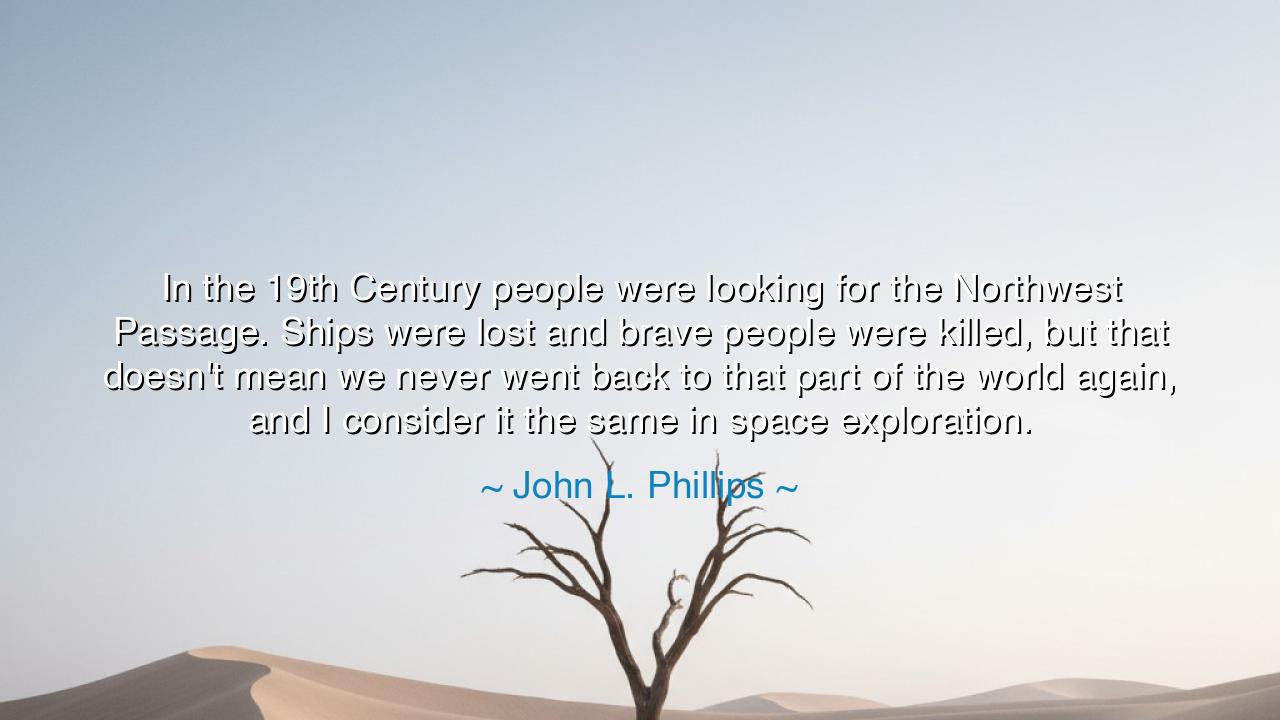
In the 19th Century people were looking for the Northwest
In the 19th Century people were looking for the Northwest Passage. Ships were lost and brave people were killed, but that doesn't mean we never went back to that part of the world again, and I consider it the same in space exploration.






Hear the words of John L. Phillips, astronaut and voyager of the heavens, who spoke with reverence for the courage of explorers past: “In the 19th Century people were looking for the Northwest Passage. Ships were lost and brave people were killed, but that doesn’t mean we never went back to that part of the world again, and I consider it the same in space exploration.” Here is a truth older than nations and as enduring as the stars—that human beings are called to press forward, even when the path is perilous, even when the cost is high. For though failure and loss may meet the seeker, they are but the price of opening new frontiers.
The origin of this saying lies in Phillips’ reflection upon the long story of exploration. The Northwest Passage, a dreamed-of sea route through the frozen Arctic, tempted sailors for centuries with the promise of riches and faster trade. Expeditions were launched with hope and determination, but many ended in disaster. Ships were trapped in the ice, crews vanished into the white silence, and graves were left beneath the snow. Yet, as Phillips recalls, humanity did not abandon the dream. Again and again, explorers returned, until at last the passage was charted. He saw in this the mirror of our modern quest for space exploration: though missions may falter and lives may be lost, the spirit of discovery compels us to rise and return.
Consider the fate of Sir John Franklin’s expedition in 1845. With two ships and over one hundred men, he set forth to conquer the Northwest Passage. They were never seen alive again. Their ships lay locked in the ice, their bones scattered across the tundra. To many, this would have been proof enough to turn away forever. Yet others followed. Decades later, Roald Amundsen finally threaded his way through the icy maze and achieved what Franklin had sought. The cost was immense, but the triumph was undeniable. This is the very story Phillips evokes when he speaks of ships lost and brave people killed, yet of humanity’s refusal to surrender.
So too in the history of flight and space. When the Challenger was lost in 1986, when Columbia fell in 2003, voices arose asking if it was worth the risk. But as Phillips reminds us, to abandon exploration because of tragedy is to abandon the very spirit that defines us. Just as the explorers of the 19th century braved the Arctic’s deathly silence, so too must modern voyagers brave the cold void of space. For though the dangers are many, so too are the rewards: knowledge, growth, and the opening of paths for generations yet unborn.
The emotional power of this quote lies in its blending of sorrow and hope. Phillips does not deny the cost—ships were lost, brave people killed. He honors their sacrifice. But he also points to the greater truth: that exploration is not measured only by survival, but by persistence. The Arctic was not won in a single voyage, nor will space be conquered in a single generation. True exploration is not the act of reaching the goal quickly, but the act of refusing to stop until the goal is reached.
The lesson is clear: do not let the failures of the past become the chains of the future. In your own life, when you face defeat, when your ships sink in the ice of hardship, do not believe the journey is ended. Learn, rise, and try again. For all great triumphs are born of persistence after tragedy. And on a larger scale, remember that humanity cannot retreat from the frontier; if we fall, we must rise again, lest our spirit wither and our future shrink.
So let your practice be this: when you meet with loss, honor it, grieve it, but do not surrender to it. Carry the memory of those who fell as a torch to light your own way forward. For as Phillips teaches, exploration—whether of oceans, of space, or of the human spirit—is a story of many attempts, many failures, and ultimate triumph. And just as the Northwest Passage was finally found, so too will the stars yield to those who refuse to give up the quest.






AAdministratorAdministrator
Welcome, honored guests. Please leave a comment, we will respond soon